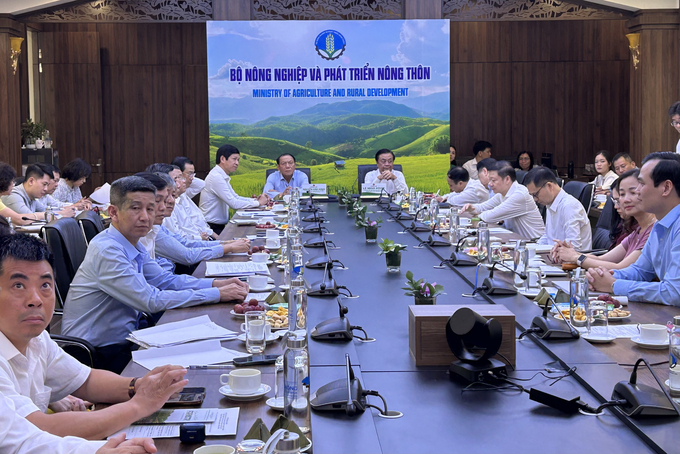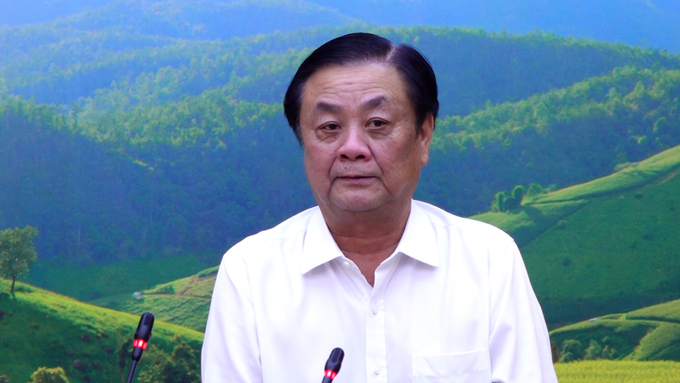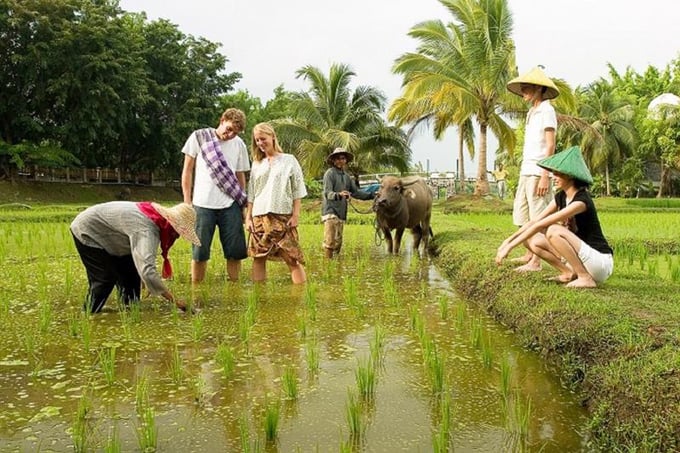May 19, 2025 | 11:18 GMT +7
May 19, 2025 | 11:18 GMT +7
Hotline: 0913.378.918
May 19, 2025 | 11:18 GMT +7
Hotline: 0913.378.918

Seminar on Enhancing the Integrated Values of Agricultural Tourism "Two is One - One of Two," was arranged by MARD and the Ministry of Culture, Sports, and Tourism on the afternoon of June 1. Photo: Linh Linh.
Developing agricultural and rural tourism is a crucial strategy and catalyst for constructing new rural regions in the agriculture sector. The aforementioned matter has been solidified in Prime Minister's Decision No. 922, which grants approval to the Program for Developing Rural Tourism in New Rural Construction for the period of 2021-2025. The seminar's mission is to facilitate a dialogue and agreement between the two Ministries regarding their perspectives and goals in order to promote agricultural and rural tourism.
Minister of Agriculture and Rural Development Le Minh Hoan cited the importance of adopting South Korea's agricultural tourism models and strategies. He proposed the idea of expanding the national tourism map to include rural areas and intangible heritage, which are somehow missed. These areas, where farmers contribute silently to the community's well-being, have the potential to enhance the country's tourism industry. This viewpoint was articulated during the Seminar on Enhancing the Integrated Values of Agricultural Tourism "Two is One - One of Two," arranged by MARD and the Ministry of Culture, Sports, and Tourism on the afternoon of June 1.
Minister Le Minh Hoan expresses his aspiration for agricultural and rural tourism to play a pivotal role in cultivating and captivating the affection of forthcoming generations towards agriculture, rural regions, ancestral heritage, and intangible principles. "Despite the issuance of resolutions and policies, it is imperative for the two Ministries to convene and collaboratively redefine the narrative, construct a novel iteration grounded in the preexisting bedrock of indigenous wisdom, homestay, farmstay... with the aim of advancing agricultural tourism offerings and furnishing comprehensive instructions to localities and farms," Minister Le Minh Hoan pondered.
Mr. Nguyen Le Phuc, Deputy Director-General of the Vietnam National Administration of Tourism, stated that the growth of agricultural and rural tourism in Vietnam is significant for the expansion of tourism routes, the integration of urban and rural areas, and the connection between tourism centers and satellite points.
According to reports from 63 provincial tourism management organizations, there are currently 488 officially recognized tourist attractions and sites in the country, with around 80% of them located in rural areas. Local areas are effectively utilizing tourism resources linked to particular agricultural assets, resulting in the development of numerous distinctive tourism offerings, including traditional culture, local delicacies, natural scenery, festivals, and craft villages.
Several regions have created unique tourism offerings centered around agricultural pursuits, including fruit orchards, tea and coffee production, flower cultivation, ornamental plant farming, animal rearing, environmentally friendly agriculture, and organic farming. Agricultural tourism is integrated with community, cultural, ecological tourism, and craft villages, with a particular emphasis on its rapid development in the northern mountainous regions, the Mekong Delta, and the Central Highlands. Several tourist villages have successfully fulfilled the OCOP criteria and ASEAN standards, and have even been honored with the UN Tourism Best Tourist Villages award.
Considerable resources have been allocated to the promotion and branding of various sites, including events such as the Fruit Festival in Ho Chi Minh City and the Mekong Delta, the Central Highlands Coffee Festival, the Golden Season in Tam Coc, Ninh Binh, and the Terraced Fields - Ripened Rice Season in the Northwest. An upcoming Ngoc Linh Ginseng Festival is scheduled to take place in October 2024.
Rural tourism infrastructure and facilities are consistently enhanced, as numerous households are implementing top-notch hospitality systems, enhancing toilet infrastructure, landscapes, and village connectivity. Several tourist initiatives have been funded to capitalize on the benefits of natural landscapes and cultural heritage, offering top-notch amenities like resorts, recreational zones, and educational farms. These activities are mostly focused on regions characterized by stunning landscapes and close proximity to large urban centers such Vietnam Hanoi and Ho Chi Minh City.

Minister Le Minh Hoan hopes that agricultural and rural tourism can help shape and attract the love of future generations for agriculture, rural areas, their roots, and intangible values. Photo: Thanh Thuy.
The focus is on the development of agricultural tourism that is linked to the consumption of agricultural products, particularly those that are part of the One Commune One Product (OCOP) program. OCOP products enhance service quality, allure tourists, and augment tourist expenditure. Local communities and individuals engaged in tourism have enhanced the utilization of technology and social media to exploit and promote rural tourism.
Mr. Ngo Truong Son, Chief of the Central New Rural Coordination Office, reported that there are currently 584 operational agricultural and rural tourism models included in local support plans as part of the Program for Developing Agricultural and Rural Tourism in New Rural Construction.
In addition, the MARD has granted approval for the implementation of a selection of 20 pilot models by the year 2025. Conferences and training sessions have been arranged to improve the skills and knowledge of program management officials and rural tourist business owners, to increase capacity, and to develop human resources. Nevertheless, the execution of the program encounters various obstacles, such as insufficient initiative in certain areas resulting in delays in the issuance of plans, difficulties in accessing and executing solutions, particularly in assessing resources and creating distinctive tourism offerings, and the lack of comprehensive planning for agricultural and rural tourism.

Many localities have developed distinctive tourism products based on agricultural activities such as fruit orchards, tea, coffee, flowers, ornamental plants, and livestock. Photo: TL.
In addition, rural tourism models frequently lack organization and coherence, leading to challenges in managing and promoting them. Moreover, the level of services provided is typically restricted, as many destinations only offer basic, one-day experiences. The Vietnam National Administration of Tourism emphasized the absence of premium, unique agricultural-tourism products that can be used for branding purposes. They also pointed out the limited availability of top-notch services like resorts and healthcare, as well as the challenges associated with land use. These factors impede the successful integration of agricultural value chains with tourism and negatively affect the management, promotion, and quality of rural tourism services.
Translated by Dieu Linh

(VAN) As a doctoral student doing research on renewable energy and electrification at Harvard University, the author shares his musings on electricity, nature, and countryside memories.

(VAN) The decree on Extended Producer Responsibility (EPR) ensures transparent management and disbursement of support funds, avoiding the creation of a “give-and-take” mechanism.

(VAN) Hue City rigorously enforces regulations regarding marine fishing and resource exploitation, with a particular emphasis on the monitoring of fishing vessels to prevent illegal, unreported, and unregulated (IUU) fishing.

(VAN) Hanoi People's Committee has issued a plan on reducing greenhouse gas emissions in the waste management sector with 2030 vision.

(VAN) Vietnam's draft amendment to Decree No. 156 proposes a mechanism for medicinal herb farming under forest canopies, linking economic development to population retention and the sustainable protection and development of forests.

(VAN) In reality, many craft village models combined with tourism in Son La have proven effective, bringing significant economic benefits to rural communities.

(VAN) The international conference titled Carbon Market: International experiences and recommendations for Vietnam was successfully held recently in Ho Chi Minh City.